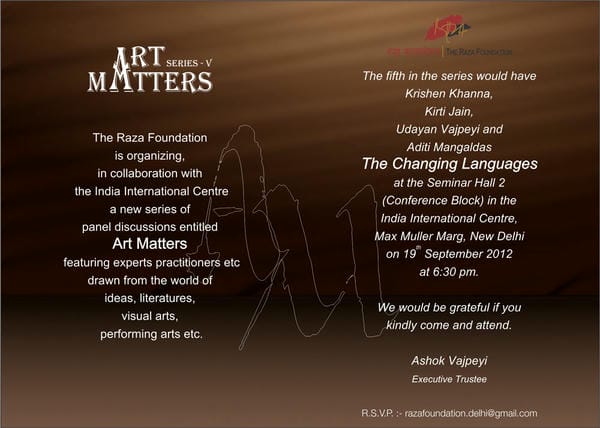
12-Sep-2012 12:00 AM
2801
The contemporary times stand witness to a constant deterioration of meaning of art and manipulation of theoretical social and political concepts as well as their practical significance. Whether they are questions as serious as social and political concerns of human rights or social exclusion affecting a dignified human survival, or as sensitive as the waning of interest in classical art forms, they call for an urgent need to revisit and discuss the prevalent conceptions.
Art has its unique way of reviving our soul from deadening monotonous routines through its multiple intricate expressions. Forming a singular perception of art or attributing a definitive meaning to it often reduces art from its fascinating complexity and expressive charm. This reductive approach confines art to its modernist understanding, which then fails to take cognizance of the artistic abstraction expressed through different forms and styles.
The Raza Foundation through its series ‘Art Matters’ provides a platform for open discussion on such issues. It endeavors not only to release the true essence of art from the clutches of definitive modernist approach in order to grasp myriad ways of extolling art, but also to stir up debate on the changing meanings of social and political theoretical concepts like rights, justice, liberty, citizenship, etc. Well known, renowned scholars and practitioners from all the diverse fields of arts, dance, music, social science, poetry, and so on are invited for this purpose.
Here, we publish the fifth panel discussion of ‘Art Matters’, titled ‘The Changing Languages’ featuring Krishen Khanna, Kirti Jain, Aditi Mangaldas and Udayan Vajpeyi.
Krishen Khanna, born in 1925 in what is now Faislabad in Pakistan, Krishen Khanna grew up in Lahore, only studying art after he graduated from college at evening classes held at the Mayo School of Art there. In 1947, Khanna’s family moved to Shimla as a result of the Partition of India and Pakistan, and Khanna was deeply affected by not only the change in his personal life, but also the socio-political chaos that reigned around him. His early works are reproductions of the scenes that were indelibly imprinted in his memory during this period. Most of Khanna’s work is figurative; he chose to not explore the abstraction that most of his contemporaries were delving into. In an interview with Saffronart he said “I used to do abstracts earlier and I have now moved on to human forms. I thought that the person or the individual is being neglected – the person in a particular situation who is influenced by the conditions around. I want to now emphasise the human beings caught up in their particular condition.”
Aditi Mangaldas is a leading dancer and choreographer in the classical Indian dance form of Kathak. With extensive training under the leading gurus of Kathak, Shrimati Kumudini Lakhia and Pandit Birju Maharaj, Aditi is today recognised for her artistry, technique, eloquence and characteristic energy that mark every performance. Besides dancing and choreographing classical productions, both solo and group, she has broken new ground by using her knowledge and experience of Kathak as a springboard to evolve a contemporary dance vocabulary, infused with the spirit of the classical. Considered a maverick in India, she has consistently broken ground, unafraid to confront social and present day concerns. Celebrated around the world for the startling richness and intricacy of her dance and choreography, she was recently nominated in the category of outstanding performance (classical) by the National Dance Critics Circle awards-2017 in the UK. She was awarded the Gujarat Sangeet Natak Academy award, India 2007 as well as the National Sangeet Natak Akademi award, India 2013, that due to compelling reasons, she declined. She has won much critical acclaim in major dance festivals across the world. As quoted by the Guardian, London, 2017, “Mangaldas owned the stage without trying to earn it……” Or at the Perth International Arts Festival, 2016, “Her artistry and poise, her dramatic gifts and unshakable technique are truly astounding; dance as effortlessly compelling as this is a joy to watch in itself”…. and at the Edinburgh International Festival, 2012,“ Her concept of the intangible embraces the divine and the profoundly human: love and freedom, truth and beauty being as cosmically mystical as god.”
Udayan Vajpeyi, born 1960. Hindi poet, essayist, short fiction and script writer. He has published two volumes of poetry, a short story collection, a book of essays and other miscellaneous publications (including a book of recreated folktales and an account of an extended conversation with filmmaker Mani Kaul). His work has been translated into Bengali, Tamil, Oriya, Kannada, English, French, Swedish, Polish and Bulgarian. He teaches Physiology at Gandhi Medical College, Bhopal. He has translated works by Octavio Paz, Borges, Chekhov, Brodsky, Jaccottet, Tadeus Rozewicz, among others, into Hindi. He has been invited to various festivals in India and overseas, the most recent being a seminar on the folk imagination in Moscow and the International Book Fair in Paris in 2007. He has received various awards for his writing, including a Senior Fellowship from the Government of India (1994 – 96), the Krishna Baldev Award (2001) and the Raja Foundation Award (2003).
The event was organised at the Indian International Centre on 19th of September 2012.